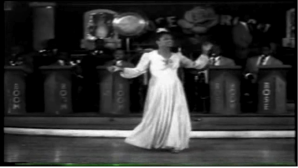Queering Pop Music Studies
I had a female impersonator for years named Jean LaRue. I didn’t tell you about that. She was out of Oakland. I don’t know if she is living or dead. She was with me for years. Name was Jean LaRue. (August 14, 1998 Interview of Clarence ‘Little Red’ Tenpenny).
“Little Red” was one of my richest sources of information (and knowledge) when I was doing research for my Master’s thesis on the blues nightclub district that existed in North Richmond, California from the mid-40s to early ’70s. Red mentioned Jean LaRue in our first interview but didn’t mention that she was a female impersonator until a later conversation. That remark sparked my interest and led to later research, which resulted in my writing “Gender Crossings: A Neglected History in African American Music”*, an analysis of the exclusion of female and male impersonators from the history of African American music. I’ve also written an encylcopedia entry for the long-delayed but forthcoming Encyclopedia of African American Music: “Transgendered Experience in African American Music” (a terrible title — not my choice). {Digital copies of this entry and/or my MA thesis Musical Community: The “Blues Scene” in North Richmond, California available on request
Also, check out Sherrie Tucker’s excellent article “When Did Jazz Go Straight? A Queer Question for Jazz Studies” in Critical Studies in Improvisation (2008). An insightful article that asks the right questions (and kindly cites my article “Gender Crossings”). I haven’t checked it out yet but Sherrie is one of the editors of Big Ears: Listening for Gender in Jazz Studies that was published in October, 2008.

Female Impersonator Jean LaRue with the Red Calhoun Orchestra (from "Woman's a Fool to think her man is all her own" -- Nationwide Production, 1947 -- available from ACinemaApart.com) Not the Jean La Rue that Clarence Tenpenny told me about. La Rue seems to have been a popular stage name for female impersonators (i.e. the famous British entertainer Danny La Rue).
* published in Queering the Popular Pitch in 2006 (Sheila Whiteley & Jennifer Rycenga, eds. – New York & London: Routledge). 2006.

You might be interested to listen to the following:-
http://www.cbc.ca/radio2/programs/insidethemusic/itm_listenagain/2010/03/01/i_got_mine_the_story_of_jackie_1.html
Ray Astbury
March 2, 2010 at 2:19 pm
[…] Queering pop music studies (decipheringculture.com) […]
Sissy Bounce — an anomaly or just another transgendered musical tradition « POP CULTURE TRANSGRESSIONS
September 24, 2010 at 8:20 pm